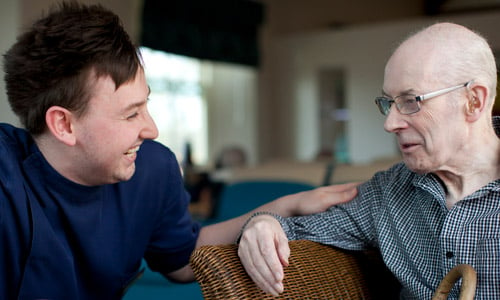Dementia is something that most of us have encountered. It’s a painful and highly personal topic that affects many lives, so is frequently the subject of books, TV programmes and films.
 Last month, I went to see a play called In Other Words in London and was deeply moved by it. The play follows Jane and Arthur through 50 years of their life together – before and after Arthur’s dementia diagnosis. It explores the way in which music – specifically Frank Sinatra’s – holds them together to the very end. A small stage and a pared-back set made for an incredibly intimate atmosphere, which made Jane and Arthurs’ performances all the more captivating.
Last month, I went to see a play called In Other Words in London and was deeply moved by it. The play follows Jane and Arthur through 50 years of their life together – before and after Arthur’s dementia diagnosis. It explores the way in which music – specifically Frank Sinatra’s – holds them together to the very end. A small stage and a pared-back set made for an incredibly intimate atmosphere, which made Jane and Arthurs’ performances all the more captivating.
The play had such an impact on me that I was compelled to speak to its writer, Matthew Seager, who also plays Arthur, afterwards. There was so much to say, in fact, that we arranged to speak again soon.
Real-life inspiration
When we did, we started at the beginning. Matthew explained how the play was inspired by his experiences at university. He and a few other theatre students visited a care home during their final year and put on sensory stimulation workshops with the residents, most of whom were living with various types of dementia. Each session was dedicated to one of the five senses.
“For our second session,” Matthew tells me, “we had an idea to play some music. I did some maths in my head and thought ‘if the average age is around 85 years old, they probably would’ve been listening to someone like Frank Sinatra in their 20s and 30s.’ So, we picked My Way.” The students left out lyric sheets in case anyone wanted to sing along. Matthew worried that no one would engage with the music, but this feeling soon fell away. “Almost every single person in that room stood up and, without even needing the song sheets, sung every word”. This experience stayed with Matthew – he talks about it as a “formative moment in [his] life” – and so, a year later, he created In Other Words.
As well as his experiences in a care home, Matthew drew on many sources of knowledge and inspiration, including documentaries and books. He worked hard to get it right because “it matters so much to so many people”.
Individual experiences, universal themes
Over the past six years, Matthew has done runs of the show with three different actors playing the role of Jane and “it’s been interesting to see how the play, as an emotional journey, changes depending on [who plays Jane]”.
One actor approached the role of Jane with lots of emotion; one was more reserved, trying to hold back that emotion; and the Jane in the production that I saw sometimes used humour to deflect from more difficult moments. In this way, Jane’s storyline sheds light on the complex and often conflicting emotions associated with caring for someone. There’s no one way to be a carer. Carers may feel hopeless or guilty or angry, or a combination of these, as well as still so full of love for the person they care for, as Jane is for Arthur. And different carers will process these emotions differently.

So many of us have first- or second-hand stories about dementia. And yet it’s not spoken about enough. The raw honesty of the play made it, at times, a very difficult watch. There were moments when I had to look at the floor to stop myself from sobbing, and I could hear other audience members holding back tears around me.
In this way, In Other Words serves as a means for people to open up the conversation around living with dementia and being a carer. Matthew tells me that the post-show conversations he has with audience members are “the main reason that [he doesn’t] want to stop doing the play yet”. People share personal stories, having connected with something in the play.
This was the case for me, too. Although I was a child at the time, I still have vivid memories of my grandma living in the later stages of dementia towards the end of her life. Unfortunately, these are my most recent memories of her. But I’ve made an effort to remind myself of earlier memories of her – when she’d make dressing gowns and ballet skirts for me, when she was stern with me, and when she’d kiss and cuddle me.
Getting it right
It’s heartening to know that the work I do at Age UK to create information and advice for older people can help those who may be in painful and confusing situations – even if only a little. The Information and Advice Team works hard to make sure that the content we produce around dementia is widely applicable, honest and helpful.
To ensure we get this right, we draw upon several sources of expertise and knowledge, just as Matthew drew on several sources of inspiration for his play. We get external feedback on our content from dementia-specialist charities, like Dementia UK, as well as feedback from our in-house experts (the Technical Advice Support Officers). We also gather feedback from members of the public through our Readers' Panel and focus groups.
And, each year, we get to meet older people living with dementia and their carers at the Alzheimer’s Show. I was fortunate enough to go this year along with colleagues. Opportunities like this bring us face to face with the real people in challenging situations we are working to support, which is incredibly valuable and rewarding.
Pics from the play: Tom Dixon
Living with dementia
If you or someone you know is living with dementia, we have information and advice that may help.





